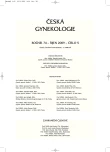Monitoring of haemocoagulative changes during long-term doses of low molecular weight heparin during pregnancy
Authors:
P. Šigutová 1; Z. Hajšmanová 1; J. Šlechtová 1; I. Šubrt 2; L. Hradecký 3; Z. Ulčová-Gallová 3
Authors‘ workplace:
Ústav klinické biochemie a hematologie LF UK a FN Plzeň, přednosta prof. MUDr. J. Racek, DrSc., vedoucí pracoviště MUDr. J. Šlechtová
1; Ústav lékařské genetiky LF UK a FN Plzeň, přednosta MUDr. I. Šubrt
2; Gynekologicko-porodnická klinika LF UK a FN Plzeň, přednosta doc. MUDr. Z. Rokyta, CSc.
3
Published in:
Ceska Gynekol 2009; 74(5): 348-354
Overview
Objective:
The aim of study was to compare plasma levels of selected coagulation parameters in pregnant women with long-term administration of low molecular weight heparin (LMWH) versus cohort of healthy women LMWHs untreated.
Design:
Prospective study.
Setting:
Department of Haematology, Institute of Clinical Biochemistry and Haematology, Charles University and University Hospital, Plzen.
Methods:
We examined 67 pregnant women with recurrent fetal loss in previous pregnant history treated by long-term prophylactic administration of LMWH. Blood samples were collected before gestation and at 10th, 20th, 30th gestational weeks.
Results:
Pregnant women with own history of recurrent fetal loss treated by the long-term prophylactic dose of LMWHs during pregnancy have the same values of the coagulation parameters as the control cohort in spite of fact that the clinical efficacy of administered LMWHs is high.
Conclusion:
Our results suggest that heparin may act by many unknown different mechanisms, such as inhibition of complement binding or secretion of prostaglandins.
Key words:
recurrent fetal loss, pregnancy, haemostasis, low molecular weight heparin.
Sources
1. Bates, SM., Greer, IA., Hirsch, J., et al. Use of antithrombotic agents during pregnancy. ACCP guidelines, 7th Ed., Chest, 2004, 126, p. 627S-644S.
2. Bates, SM., Greer, IA., Pabinger, I., et al. Venous thromboembolism, thrombophilia, antithrombotic therapy, and pregnancy. ACCP evidence-based clinical practice guidelines. 8th Ed., Chest, 2008, 133, p. 844S-884S.
3. Bick, RL. Recurrent miscarriage syndrome and infertility caused by blood coagulation protein/platelet defects. In: Hematological complications in obstetrics, pregnancy, and gynecology. Ed. Blick, RL., Cambridge University Press, 2006, p. 55-74.
4. Brenner, B. Thrombophilia and pregnancy loss in first intended pregnancy. J Thromb Haemost, 2005, 3, p. 2176–2177.
5. Brenner, B. Antithrombotic prophylaxis for women with thrombophilia and pregnancy complications –Yes. J Thromb Haemost, 2003, 1, p. 2070-2072.
6. Brenner, B. Maternal anticoagulant prophylaxis for prevention of pregnancy loss in women with trombophilia. J Thromb Haemost, 2003, 1, p. 416-417.
7. Brenner, B., Hoffman R., Carp H., et al. for the LIVE - ENOX investigators. J Thromb Haemost, 2005, 3, p. 227 - 229.
8. Brenner, B. Hemostatic changes in pregnancy. Thrombosis Res, 2004, 114, p. 409-412.
9. De Groot, PD., Derksent RHWM. Pathophysiology of the antiphospholipid syndrome. J Thromb Haemost, 2005, 3, p. 1854–1860.
10. Gris, JC., Mares, P. The long and winding road towards LMWH for pregnancy loss. Thromb Haemost, 2005, 3, p. 224-226.
11. Gris, JC., et al. Low - molecular - weight heparin versus low dose aspirin in women with one fetal loss and a constitutional thrombophilic disorder. Blood, 2004, 103, 10, p. 3695-3699.
12. Hajšmanová, Z., Šlechtová, J., Šigutová, P., et al. Průběh těhotenství při dlouhodobém podávání nízkomolekulárního heparinu pro opakované těhotenské ztráty. Čes Gynek, 2008, 73, 5, s. 278-283.
13. Kvasnička, J., Srp, B., Bendl, J., et al. Hemostáza v těhotenství, Čes Gynek, 1994, 59, 1, s. 21-28.
14. Levi, M. All heparins are equal, but some are more equal than others. J Thromb Haemos, 2003, 1, p. 884–885.
15. Lindquist, PG. Low molecular weight heparin for repeated pregnancy loss: is it based on solid evidence? J Thromb Haemost, 2003, 3, p. 221-223.
16. Redline, RW. Hemorrhagic and thrombotic lesions of the placenta, In: Hematological complications in obstetrics, pregnancy, and gynecology. Ed. Blick, RL., Cambridge University Press, 2006, p. 251-268.
17. Rey, E., David, M. Fetal loss, thrombophilia and heparin: the clinician’s dilemma. J Thromb Haemost, 2005, 3, p. 782-783.
18. Walker, D. The use of LMWH in pregnancies at risk: new evidence or perception? J Thromb Haemost, 2005, 3, p. 778-793.
19. Salmon, JE. Are heparins effective in some patiens with recurrent pregnancy loss because they inhibit complement activation? J Thromb Haemost, 2005, 3, p. 783-784.
20. Sudrová, M., Kvasnička, J., Linhartová, P., et al. Trombofilie v těhotenství – fyziologie a patofyziologie hemokoagulačních změn v normální graviditě a při některých patologických těhotenských stavech. Čas Lék čes, 2007, 146, 11, s. 853-857.
21. Ulcova-Gallova, Z., Krauz, V., Novakova, P., et al. Anti - phospholipid antibodies against phosphatidylinositol, and phosphatidylserine are more significant in reproductive failure than antibodies against cardiolipin only. Amer J Reprod Immunol, 54, 2005, p. 112-117.
Labels
Paediatric gynaecology Gynaecology and obstetrics Reproduction medicineArticle was published in
Czech Gynaecology

2009 Issue 5
-
All articles in this issue
- Use of transrectal ultrasound and magnetic resonance imaging in the staging of early-stage cervical cancer
- Ultrasound-guided tru-cut biopsy in the treatment of abdomino-pelvic advanced tumors
- Proteomics and biomarkers for detection of cervical cancer
- Current knowledge of ductal carcinoma in situ
- Monitoring of haemocoagulative changes during long-term doses of low molecular weight heparin during pregnancy
- Trends in operative delivery rates
- Early pregnancy loss and inherited thrombophilic states
- Risk of smoking for the cardiovascular diseases starts even before the birth
- Birth defects incidence in children from single and twin pregnancies in the Czech Republic – current data
- Cancer of endometrium - rare variant of remote metastases
- Acute hysterectomy for huge submucous leiomyoma prolaps
- Combined hormonal contraception in woman with persistent functional ovarian cysts – case report
- Czech Gynaecology
- Journal archive
- Current issue
- About the journal
Most read in this issue
- Current knowledge of ductal carcinoma in situ
- Acute hysterectomy for huge submucous leiomyoma prolaps
- Cancer of endometrium - rare variant of remote metastases
- Early pregnancy loss and inherited thrombophilic states
